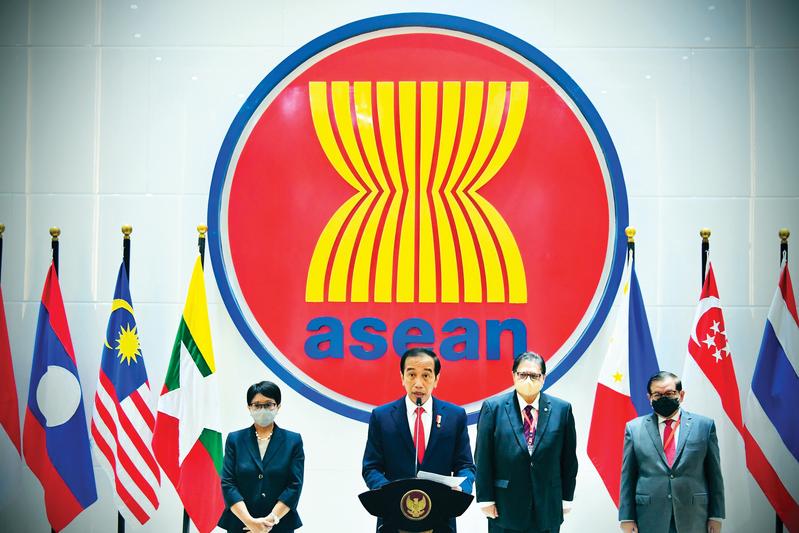 Leaders of the Association of Southeast Asian Nations hold an emergency meeting in Jakarta, Indonesia, on April 24. (LAILY RACHEV, INDONESIAN PRESIDENTIAL PALACE VIA AP)
Leaders of the Association of Southeast Asian Nations hold an emergency meeting in Jakarta, Indonesia, on April 24. (LAILY RACHEV, INDONESIAN PRESIDENTIAL PALACE VIA AP)
Aconsensus reached by ASEAN leaders on the need for constructive dialogue in Myanmar, with an end to violence, is encouraging as a means of helping to resolve the tensions in the country, experts said.
The consensus was agreed at a meeting of leaders of the Association of Southeast Asian Nations in Jakarta on April 24. It was significant, the experts said, but the process in Myanmar would take some time.
Dylan Loh, an assistant professor of public policy and global affairs at Nanyang Technological University, said the consensus shows there is a possibility that the Myanmar military may be willing to de-escalate tensions.
“The five-point consensus statement clearly used more forceful language than usual, and there is a sense among ASEAN that this crisis is a severe test of ASEAN’s centrality and cohesion and that it must rise to meet the occasion,” Loh said.
A chairman’s statement after the leaders’ meeting said the bloc acknowledged ASEAN’s positive and constructive role in facilitating a peaceful solution in the interests of the people of Myanmar.
ASEAN groups Brunei, Cambodia, Indonesia, Laos, Malaysia, Myanmar, the Philippines, Singapore, Thailand and Vietnam.
The first of the five points of the consensus requires violence in Myanmar to cease immediately and all parties to exercise the utmost restraint.
It also said constructive dialogue among the parties concerned shall begin in order to reach a peaceful solution that serves the people.
“A special envoy of the ASEAN chair shall facilitate mediation of the dialogue process, with the assistance of the secretary-general of ASEAN,” it said.
The in-person meeting in the Indonesian capital was the first ASEAN summit since the Myanmar military detained government leaders U Win Myint and Aung San Suu Kyi, among others, and began governing the country on Feb 1.
The meeting was attended by leaders of Brunei, Cambodia, Indonesia, Malaysia, Singapore and Vietnam, along with Myanmar’s commander-in-chief of defense services and chair of the country’s newly formed State Administration Council, Min Aung Hlaing.
The foreign ministers of Laos, Thailand and the Philippines also attended as representatives.
Oh Ei Sun, a senior fellow with the Singapore Institute of International Affairs, said the appointment of an envoy is a step forward, but resolution of the crisis will take time.
Thitinan Pongsudhirak, director of the Institute of Security and International Studies at Chulalongkorn University in Bangkok, said the consensus “omitted calls for the release of political prisoners and restoration of poll results from last November”.
Hundreds of people have died during the protests against the military’s move, according to nongovernmental organizations in Myanmar.
Before leaders gathered in Jakarta, Chinese State Councilor and Foreign Minister Wang Yi said China expected the meeting to make a good start for the “soft landing” of the situation in Myanmar and that China will maintain close communication with ASEAN and work with all parties in Myanmar in its own way.
Wang made the comments on April 22 in phone calls with counterparts from Brunei and Thailand, the current and next chairs of the bloc, respectively.


